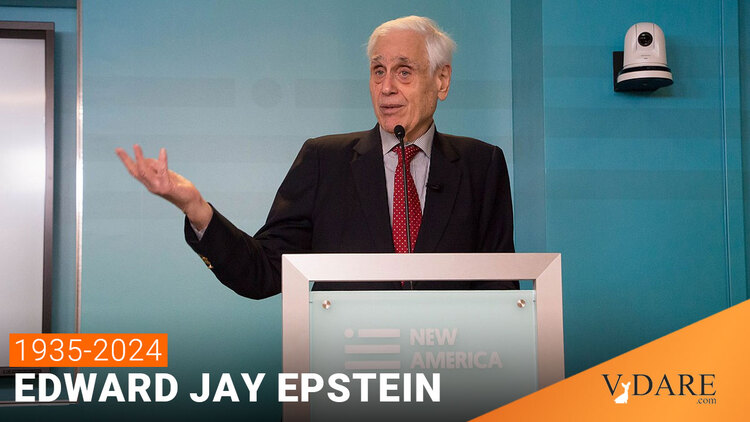
By Steve Sailer
01/15/2024
The investigative reporter has died at age 88. I reviewed his memoir Assume Nothing: Encounters With Assassins, Spies, Presidents, and Would-Be Masters of the Universe last spring.
Epstein, now in his mid-80s, was a star during the legendary Tom Wolfe Era of magazine journalism when nonfiction writers could become moderately wealthy writing for the big New York magazines. In that long-gone era, reporters were expected to subvert power, not be the ill-paid but loyal servants of the system as they are today.
And yet, Epstein’s career flourished because the mighty tended to see him as a potential sympathizer and thus often provided him with abundant human interest material about themselves before he stuck the shiv in.
From his Ph.D. adviser [James Q.] Wilson, author of the political science classic Bureaucracy, Epstein learned the “organizational theory” perspective that made him averse to assuming that all the scandalous disclosures he uncovered necessarily added up to some overarching conspiracy. While there are some real-life Bond villains like [Armand] Hammer, most things get done by large organizations of officials of highly constrained competence. …
For instance, even though Epstein’s JFK book Inquest was essential to the growth of American conspiracy theorizing by proving just how fallible the Warren Commission had been, Epstein himself, over three books on the assassination, never adopted a particular conspiracy theory. To Epstein, the time limitations put on the investigating staffers by Chief Justice Earl Warren — such as that they couldn’t go to Dallas until after Jack Ruby’s trial was finished, and then they had to wrap up before the election — did not appear to grow out of some nefarious plot to cover up the awful truth. Instead, they simply appear to have turned out to have been mistakes that had seemed like good ideas at the time to Warren.
It’s not immediately obvious why so many cunning men didn’t flatly turn down this dangerous journalist’s entreaties. Epstein himself sketches an explanation on the first page of his memoir. For one thing, he’d grown up in New York affluent and Jewish at a time of rapidly growing Jewish success. (Numerous rich Jews seemed to assume that he’d pass up exposing their foibles because that wouldn’t be “good for the Jews,” but Epstein isn’t very ethnically biased.)
But his big advantage, he writes, was that at age 12, a difficult time for most boys, he was already 6′ 2″ and 200 pounds. This precocious size “conferred on me a bold social confidence that would remain.” Whereas magnates tend to see most reporters as ink-stained wretches, many seemed to find the audaciously assured Epstein as, by nature, a fellow buccaneer.
Hence, Epstein’s book includes a remarkable array of encounters with the rich, famous, and notorious, from Vladimir Nabokov to Jeffrey Epstein. …
Not surprisingly, Jeffrey Epstein wanted to hear from Edward Jay Epstein all about his old professor, the author of Lolita. The jailbait aficionado was disappointed that the author’s recollections of that great man of letters were so seemly.
This is a content archive of VDARE.com, which Letitia James forced off of the Internet using lawfare.